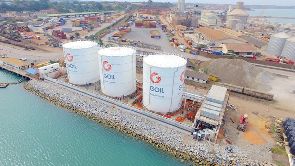The 13.5m litre marine gas oil storage facility at the Takoradi Port in the Western Region Last year, an average of 9,500 tonnes of refined petroleum products was consumed daily by individual, residential and commercial consumers.
With national consumption ending 2017 at 3.46 million tonnes, it was not surprising that oil imports for the year firmed up to almost US$2 billion, representing 15.7 per cent of the value of the year’s total imports.
For an economy that is projected to enjoy annual growth rates of above five per cent in the medium-to-long term, more refined petroleum products will surely be needed to help fuel additional cars and ships, power industries and keep thermal plants running for existing and new factories to operate.
Although a good prospect, the projected strong demand for refined petroleum products begs the question of how much of the resulting returns will return directly into the local economy? Better put, what will be the share of indigenous firms in meeting that demand?
At the heart of that question are the ownership structure and the market share of current bulk oil distribution companies (BDCs) and oil marketing companies (OMCs) – the firms that offtake, wholesale and retail the products to end consumers in the country.
Since time immemorial, a critical mass of Ghana’s promising economy has been resigned to foreign interest, with the telecommunication, mining and now petroleum subsectors virtually becoming the sole prerogative of majority foreign-owned firms.
While no local company currently operates in the multibillion-dollar telecoms industry, the few ones in the extractive sector are at the periphery and best known for their support service roles.
The banking subsector is another victim. Of the 30 banks currently in operation, more than half – 17 banks – are majority foreign-owned. The minority domestically controlled banks are fragile – less capitalised and altogether control less than 40 per cent of the industry’s business.
Given that these are the blue-chip areas of the economy, locals being on the periphery marginalises the entire country.
In the downstream petroleum subsector, however, there is hope, thanks to the dominant role of the Ghana Oil Company Limited (GOIL).
As a market leader, its existence and sway is not just critical for the country but opportune for all the good reasons. The inspiring journey Despite a rocky start in the early 1990s, GOIL has fruitfully weathered its own version of corporate storms to now emerge an enviable company worthy of emulation by competitors […]
